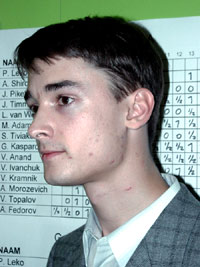A win a la Moro
Alexander Morozevich is no stranger to winning GM events with amazing scores.
His maximalist approach, backed up by tremendous talent, allows him to win equally
easily with white and black when he is in form He was definitely in form in
Biel, Switzerland, where he dominated the top event of the festival with an
astounding 8/10 score.

Final standings - Game replay and download
 It
started back in 1994 when the then-teenager scored 9.5/10 in the strong Lloyds
Bank Open. He put up more impossible numbers in tough Russian events, numbers
like 9/10 and 9.5/10. His colorblindness was more evident in 1998 when he played
seven of his ten games in the Elista Olympiad with black and won five of them.
Later that year he scored 9/10 in Pamplona, two full points ahead.
It
started back in 1994 when the then-teenager scored 9.5/10 in the strong Lloyds
Bank Open. He put up more impossible numbers in tough Russian events, numbers
like 9/10 and 9.5/10. His colorblindness was more evident in 1998 when he played
seven of his ten games in the Elista Olympiad with black and won five of them.
Later that year he scored 9/10 in Pamplona, two full points ahead.
These results launched him into the top five in the world and invitations to
supertournaments were quick to follow. There things proved much more difficult
for "Moro," who was soon a fan favorite thanks to his dynamic, unorthodox
play and drive to win every game. Spectacular victories were counterbalanced
by too many losses to compete for titles against the likes of Kasparov, Kramnik,
and Anand.
Nowadays he claims to be semi-retired and working much less on his chess. In
an
interview after Biel he stated, "I got tired of the lack of any
reasonable prospects in the chess world. What are the goals for a professional
player? There is no more clear system, no real cycle of world championships,
no clear world champion and thus no possibility for the players to fight for
a world title."
Meanwhile we'll just have to enjoy the games he does play. If,
Fischer-style, Morozevich won the Biel exhibition, then Etienne Bacrot and Ilya
Smirin tied for first place in the tournament. It was an important success for
Bacrot in a strong event. The 20-year-old has been the future of French chess
for so long he now risks becoming the past without ever having been the present.
He won his mini-matches against every competitor except Morozevich.
It was another solid event from Israel's Smirin. It looked like
he would keep the pressure on Morozevich until he was upended by Bacrot in a
brutal 26-move Grunfeld. Pelletier and Lutz were combative and played several
interesting games, but both were dominated by the medal winners.
They were saved from the cellar by Viktor Korchnoi's nightmare
performance. Simply nothing worked for the veteran; even his good position turned
into losses. Two years ago he won this event ahead of Svidler, Gelfand, et al.
Perhaps the 72-year-old will win it two years from now. Would you bet against
it?
 In
the final round Morozevich played for a win with black despite leading
Smiring and Bacrot by a full point. His queenside attack arrived before
Lutz's counterplay on the kingside even got started. In
the final round Morozevich played for a win with black despite leading
Smiring and Bacrot by a full point. His queenside attack arrived before
Lutz's counterplay on the kingside even got started.
In the diagrammed position Moro finished
things off nicely with 31..Rd3! and Lutz resigned.
A great example of an interference move.
After 32.Rxd3 cxd3 33.Nc6 Qb7 pins and wins. (33.Nf5 Qb3 34.Qg4 Rg8)
|
|  A
round earlier Morozevich proved the old saying, "the threat is stronger
than the execution" in his game against Korchnoi. A
round earlier Morozevich proved the old saying, "the threat is stronger
than the execution" in his game against Korchnoi.
In this position Morozevich has just played 20.Qd3
and Korchnoi resigned! The only move to avoid the deadly 21.Qh7 infiltration
is 20...Kg8 and then 21.Nxf7! rips the black kingside apart.
This game calls to mind Korchnoi's loss to Anand in Wijk
aan Zee, 2000. That one lasted just 19 moves and Black also resigned facing
dreadful threats against his king instead of waiting to actually see them
happen. |
Photo of Morozevich by John Henderson, all rights reserved.



















 It
started back in 1994 when the then-teenager scored 9.5/10 in the strong Lloyds
Bank Open. He put up more impossible numbers in tough Russian events, numbers
like 9/10 and 9.5/10. His colorblindness was more evident in 1998 when he played
seven of his ten games in the Elista Olympiad with black and won five of them.
Later that year he scored 9/10 in Pamplona, two full points ahead.
It
started back in 1994 when the then-teenager scored 9.5/10 in the strong Lloyds
Bank Open. He put up more impossible numbers in tough Russian events, numbers
like 9/10 and 9.5/10. His colorblindness was more evident in 1998 when he played
seven of his ten games in the Elista Olympiad with black and won five of them.
Later that year he scored 9/10 in Pamplona, two full points ahead. In
the final round Morozevich played for a win with black despite leading
Smiring and Bacrot by a full point. His queenside attack arrived before
Lutz's counterplay on the kingside even got started.
In
the final round Morozevich played for a win with black despite leading
Smiring and Bacrot by a full point. His queenside attack arrived before
Lutz's counterplay on the kingside even got started.  A
round earlier Morozevich proved the old saying, "the threat is stronger
than the execution" in his game against Korchnoi.
A
round earlier Morozevich proved the old saying, "the threat is stronger
than the execution" in his game against Korchnoi. 




